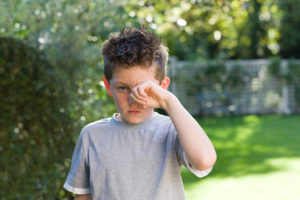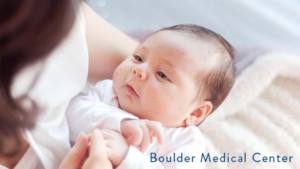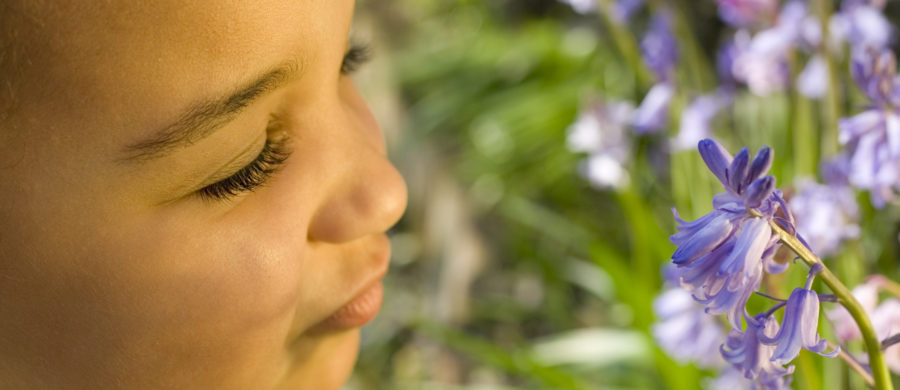Relief for Children with Seasonal Allergies
Home and Over-the-Counter Solutions can be a Good Place to Start
Lauren Brave, MD
Pediatrics Department
Boulder Medical Center
 The weather is finally consistently warmer, trees are full of leaves, flowers are blooming, and the grass is green! With our glorious spring season comes red eyes, drippy or stuffy nose, coughing and sneezing, and itchiness of the eyes, nose or skin for those who suffer from seasonal allergies, or allergic rhinitis.
The weather is finally consistently warmer, trees are full of leaves, flowers are blooming, and the grass is green! With our glorious spring season comes red eyes, drippy or stuffy nose, coughing and sneezing, and itchiness of the eyes, nose or skin for those who suffer from seasonal allergies, or allergic rhinitis.
Up to 30 percent of the U.S. population has seasonal allergies, and the frequency continues to rise. Seasonal allergies tend to appear in children who are ages three and over, as one generally needs to be exposed to a few cycles of seasons in order to become sensitive to allergens. It is possible, however, for younger children to have seasonal allergies, particularly if there’s a strong history of allergies in the family.
Many calls to our pediatric clinic this time of year are from concerned parents who need help with relieving seasonal allergy symptoms for their children. Here is a primer of things you can do at home and over-the-counter medications that may help your child (and yourself) stay comfortable while enjoying the outdoors.
Wash, Wash, Wash!
Pollens and pollution in the air settle on our hair, skin, and in the nostrils. Hence, the most important thing treatment for seasonal allergies is to wash off the day’s pollens every night; problems tend to compound if you don’t do this. Be sure to wash everything in the bath or shower, keeping in mind that water is more important than soap. Rinsing the nostrils with nasal saline spray or solution can also help, although this may be more trouble than it’s worth for younger children.
After rinsing off, apply a gentle moisturizer, such as Vanicream, for itchy skin. For tenacious itchy spots, apply hydrocortisone 1% cream twice daily. If these solutions don’t help relieve irritated skin after a few days, see your doctor.
Antihistamines
This class of over-the-counter medications is often useful for allergies. “Histamine” is the substance released by cells that create allergy symptoms, and “antihistamines” block these substances. Often known by brand names like Claritin (loratadine), Zyrtec (cetirizine), and Allegra (fexofenadine), generic antihistamines are equivalent in action. These medications are typically available as pills, chewables, and liquids. A few notes:
- Loratadine is typically the least effective antihistamine. However, if your child has benefited from loratadine in the past there is no need to change;
- Fexofenadine has the least amount of sedation as a side effect. This long-acting antihistamine is supposed to last all day — packaging usually promises relief for 24 hours — they actually last about 12 hours.
Another antihistamine, Benadryl (diphenhydramine), is short-acting and works quickly to counter a rapid onset of symptoms. This medication is likely to cause significant sleepiness.
Nasal Steroids
If nighttime or chronic congestion is troubling your child, it might be worthwhile to try nasal steroids to decrease the inflammation in the nasal and sinus tissues. The most common brands are Flonase (fluticasone) and Nasonex (mometasone) but, again, generics are completely fine. Use a nasal steroid before bed after washing the nostrils with nasal saline.
Eye Drops
 If itchy and red eyes are the only symptoms, antihistamine eye drops are available under the brand name Zaditor (ketoifen). Artificial tears may also be useful for washing out allergens. If the eyes are painful or have a thick discharge, this is not likely allergies and you should call the doctor.
If itchy and red eyes are the only symptoms, antihistamine eye drops are available under the brand name Zaditor (ketoifen). Artificial tears may also be useful for washing out allergens. If the eyes are painful or have a thick discharge, this is not likely allergies and you should call the doctor.
Depending on your child’s symptoms, any or all of these interventions may be appropriate. Correct dosing for each age is listed on the medication container, however, consult your physician with questions. Be sure to talk with your doctor if these interventions are not helping.
About Pediatrics at Boulder Medical Center
Top quality pediatric doctors in Boulder, Longmont, Louisville and beyond
 Since 1949, Boulder Medical Center has been at the heart of caring for generations of children in Boulder County and beyond. Now, almost 70 years since we began, our pediatrics department is one of the largest in the area. Our board-certified physicians are committed to providing personal, high-quality and compassionate health care for all kids — from newborns through the teenager years.
Since 1949, Boulder Medical Center has been at the heart of caring for generations of children in Boulder County and beyond. Now, almost 70 years since we began, our pediatrics department is one of the largest in the area. Our board-certified physicians are committed to providing personal, high-quality and compassionate health care for all kids — from newborns through the teenager years.
Learn More About the Pediatrics Team
The information provided in this article is intended for your general knowledge only and is not a substitute for professional medical advice or treatment for specific medical conditions. You should not use this information to diagnose or treat a health problem or disease without consulting with a qualified healthcare provider. Please consult your healthcare provider with any questions or concerns you may have regarding a medical condition.

